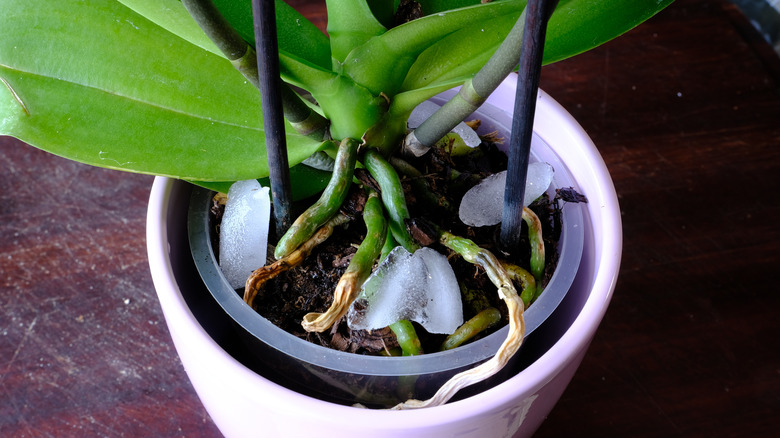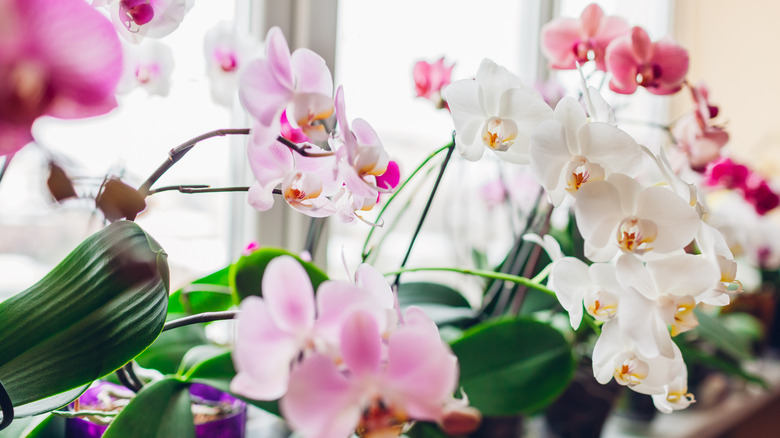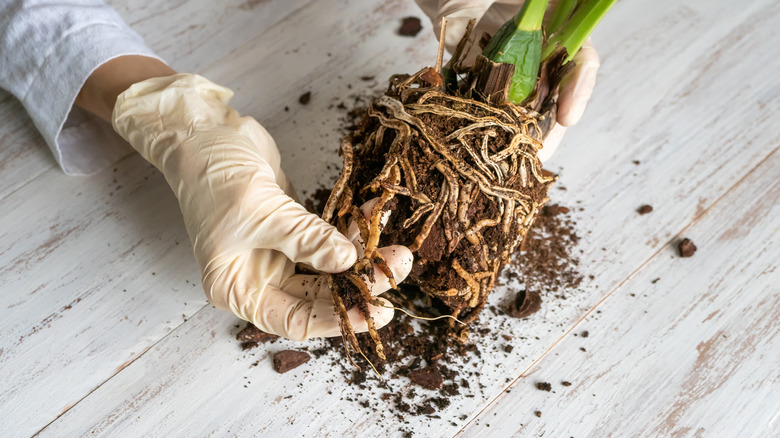TikTok's Ice Cube Hack For Watering Orchids Has The Internet Divided
A tropical plant and ice seem like a bad pairing. So, why is watering jungle-native orchids with ice cubes common practice? Passionate home gardeners share their personal success stories of watering orchids with ice on Tiktok. On the contrary, many others warn the waterers that ice will spell doom for their plant. There's a lot of internet chatter about whether watering with ice is wise or not. Is this a folk remedy to throw away, or is there no harm in letting a few cubes a week melt into your orchid? The reason behind the rhyme is that melting ice doles out a steady, controlled amount of liquid that helps prevent overwatering.
It can be tricky to successfully care for orchids. When in doubt, turn to experts with data (and dirt) on their hands. Despite rational beliefs that ice may damage an orchid's stem and exposed roots, these plants are much tougher than we realize. A university study on phalaenopsis orchids, the most common variety in the U.S., revealed that it's just as safe to water your tropical guest with ice as it is water (via The Ohio State University). Yet, not everyone with university credentials agrees that ice is the way to go. Other experienced professionals think otherwise. They claim that a few ice cubes won't serve up enough liquid for a healthy orchid, or that ice's cold temperatures can't be good for the plant. Whether they are avid gardeners or degreed horticulturists, there's no consensus about orchids and ice.
Research says ice does no harm
It turns out that the many Tiktokers who tout watering their orchids with ice are not totally off-base. A study through the Ohio State University and University of Georgia delved into the best method for watering orchids. Scientists compared two groups of moth orchids (phalaenopsis) that received the same amount of water for four to six months. One group was given room-temperature water, and the other was watered with ice cubes. At the end of the study, the flowers of both sets of plants lasted the same amount of time. Some Tiktokers worry that the ice may damage the plant tissue. The OSU and U of G researchers found that the ice cube-watered plants maintained root health by the end of the study, and that their aerial roots were not damaged when they came into contact with the ice. The scientists found that not only does watering orchids with ice cubes not harm them, the gradual dose of water may benefit the plants.
Green Circle Growers markets a line of orchids called Just Add Ice. They share that one of the main causes of orchid death is overwatering, which leads to root rot. They suggest that three ice cubes per week — the equivalent of ¼ cup of water — is the ideal amount for the plant. The slow release of water supposedly helps the plant absorb water better. It also prevents excess water from accumulating at the bottom of the pot, causing root rot.
Expert advice against the ice method
Like scores of Tiktokers on the other side of the argument, horticulturist and UCLA professor Leslie Halleck isn't a fan of the ice cube trick. Halleck claims that three ice cubes can be too little water to keep an orchid healthy, and that it can result in underwatering the plant. Halleck favors watering the orchid with liquid, taking the plant out of its pot and letting water run over the roots for a few minutes to oxygenate them once a week. Taking the orchid out of the pot while watering helps make sure that excess liquid drains away. However, Halleck also adds that if orchid owners are having success watering with ice, there's no reason to stop. Instead, they should keep a close eye on the plant's root health.
But how about the cold? Is this damaging to orchids? That's the major concern expressed by specialists at Gardener's Center in Darien, CT. They rationalize that since orchids are tropical plants, they must dislike the cold. Instead, they favor Halleck's approach to watering. Since there are well-supported arguments from both sides, it appears that to ice or not to ice is entirely up to you. You can boost your chances of success with our guide, orchids: everything you should know before planting.


